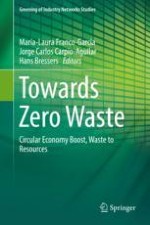2019 | OriginalPaper | Buchkapitel
4. Feasibility Analysis of a Cap-and-Trade System in Mexico and Implications to Circular Economy
verfasst von : José-Luis Cruz-Pastrana, María-Laura Franco-García
Erschienen in: Towards Zero Waste
Aktivieren Sie unsere intelligente Suche, um passende Fachinhalte oder Patente zu finden.
Wählen Sie Textabschnitte aus um mit Künstlicher Intelligenz passenden Patente zu finden. powered by
Markieren Sie Textabschnitte, um KI-gestützt weitere passende Inhalte zu finden. powered by
